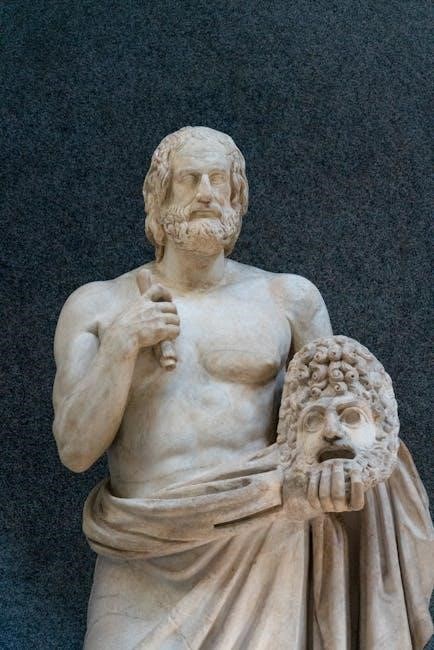Medea, a tragic heroine, embodies a complex mix of revenge, betrayal, and maternal anguish. Euripides’ masterpiece explores her devastating journey after Jason’s betrayal, highlighting themes of revenge and justice.
1.1 Overview of the Play
Medea, written by Euripides, is a Greek tragedy that revolves around the tale of Medea, a sorceress, and her quest for revenge against her unfaithful husband, Jason. Set in Corinth, the play explores Medea’s emotional turmoil after Jason abandons her for Glauce, the daughter of King Creon. Medea’s revenge involves the tragic deaths of Glauce, Creon, and her own children, showcasing her cunning and ruthless determination. The play delves into themes of betrayal, justice, and the consequences of unchecked emotions, making it one of Euripides’ most profound works.
1.2 Historical Significance
Euripides’ Medea, written in 431 BC, holds a pivotal place in Greek tragedy, reflecting the societal tensions of its time. Performed during the Peloponnesian War, it explored themes of revenge, betrayal, and gender roles, resonating deeply with its audience. The play’s portrayal of a powerful, vengeful woman challenged traditional gender norms, making it a groundbreaking work in ancient Greek theater. Its historical significance lies in its bold critique of morality and justice, as well as its enduring influence on Western literature, solidifying Euripides’ reputation as a master of tragic drama.
1.3 Themes and Motifs
Euripides’ Medea explores profound themes such as revenge, betrayal, and morality. Medea’s relentless pursuit of vengeance against Jason, driven by his infidelity, underscores the destructive nature of unchecked emotion. The play also examines gender roles, highlighting Medea’s defiance of patriarchal norms. Another motif is the tension between justice and revenge, as Medea’s actions blur the line between rightful retribution and moral corruption. These themes, intertwined with the chorus’s reflective commentary, create a rich tapestry of human conflict and ethical dilemmas, making the play a timeless exploration of human nature and societal norms.

Historical Context of Medea
Euripides wrote Medea in 431 BCE, during the Golden Age of Athens. The play draws from Greek mythology, exploring cultural and societal tensions of the era.
2.1 Euripides and His Era
Euripides, a prominent tragedian of 5th-century BCE Athens, lived during the Golden Age of Pericles. His works, including Medea, showcased his innovative approach to drama, emphasizing psychological complexity and societal critique. Euripides often challenged traditional mythological narratives, exploring themes like gender roles and emotional turmoil. His era saw the rise of Athenian democracy and cultural advancements, which influenced his writing; The Theater of Dionysus, where his plays were performed, became a hub for intellectual and artistic expression. Euripides’ Medea reflects his era’s fascination with human conflict and moral ambiguity, making it a timeless classic.
2.2 The Mythological Background of Medea
Medea, a sorceress and daughter of King Aeetes of Colchis, played a pivotal role in Greek mythology. She famously assisted Jason in obtaining the Golden Fleece, using her magical powers to overcome obstacles. Their union produced two children, but Jason’s betrayal by abandoning Medea for Glauce, the daughter of Creon, ignited a tragic chain of events. Euripides’ adaptation of this myth delves into themes of revenge, betrayal, and the consequences of divine and human actions. Medea’s story has captivated audiences, blending mythological elements with human emotional depth, making it a cornerstone of classical literature.
2.3 Cultural Influences on the Play
Euripides’ Medea reflects the cultural and societal norms of ancient Greece, particularly the tensions between individual desire and societal expectations. The play critiques the patriarchal structures of the time, as Medea challenges the gender roles imposed on her. Drawing from Greek mythology, Euripides uses Medea’s story to explore themes of justice, revenge, and morality, resonating with the intellectual and philosophical debates of his era. The cultural context of Athens during the Peloponnesian War also influenced the play’s themes of conflict and human suffering, making it a timeless reflection of societal values and human nature.

Structural Analysis of Medea
Medea’s dramatic structure builds tension through a tragic narrative, with the chorus providing context and emotional depth, while key scenes drive the plot’s devastating progression.
3.1 Plot Summary
Medea, a tragic play by Euripides, revolves around the titular character, Medea, a sorceress and former princess of Colchis. After aiding Jason in obtaining the Golden Fleece, Medea marries him and bears two children. However, Jason betrays her by marrying Glauce, the daughter of King Creon of Corinth. Devastated and enraged, Medea seeks revenge. Despite her emotional turmoil, she cleverly manipulates those around her, including Creon and Glauce, leading to their tragic demise; Ultimately, Medea kills her own children to inflict ultimate pain on Jason, leaving him shattered and childless. The play explores themes of betrayal, revenge, and the consequences of unchecked emotions.
3.2 Dramatic Structure
Euripides’ Medea follows a traditional Greek tragic structure, beginning with a prologue that establishes the backstory. The play unfolds through dialogue-driven episodes, interspersed with choral odes that provide moral reflection. The chorus, composed of Corinthian women, serves as a moral compass, offering insights into Medea’s emotional state; The dramatic tension escalates through a series of confrontations, leading to the peripeteia, where Medea resolves to kill her children. The play’s structure builds towards a devastating climax, emphasizing the inevitability of tragic outcomes and the catharsis of emotional suffering.

3.3 Key Scenes and Their Importance
Central scenes in Medea highlight pivotal moments that drive the tragic narrative. Medea’s emotional monologue in the first act reveals her inner turmoil and sets the tone for her vengeful resolve. The confrontation with Jason in Act Two underscores the depth of betrayal and Medea’s anguish. The Chorus’s lamentations provide moral commentary, while Medea’s decision to murder her children marks the play’s tragic apex. These scenes collectively illustrate the destructive power of revenge and the moral dilemmas faced by the characters, reinforcing the play’s enduring themes of justice and human suffering.

Themes in Medea
Medea explores themes of revenge, betrayal, and justice, while challenging gender roles and societal norms, highlighting the complexities of human emotions and moral dilemmas.
4.1 Revenge and Its Consequences
Medea’s relentless pursuit of revenge against Jason drives the play’s tragic narrative. Her decision to kill her children and Glauce underscores the devastating consequences of unchecked vengeance. Euripides portrays revenge as a destructive force, leading to moral and emotional turmoil. Medea’s actions spark a cycle of suffering, emphasizing the futility of revenge and its impact on both perpetrator and victim. The play questions the true cost of justice, leaving audiences to grapple with the ethical implications of Medea’s choices and the enduring legacy of her tragic revenge.
4.2 Gender Roles in Ancient Greece
Euripides’ Medea critiques the rigid gender roles of ancient Greece, where women were marginalized and denied autonomy. Medea, a powerful yet oppressed figure, challenges societal norms through her intelligence and magical prowess. The play highlights the limitations placed on women, as Medea’s options are constrained by her gender, leading to her radical actions. Her struggle reflects the broader oppression of women in a patriarchal society, emphasizing the lack of rights and agency afforded to them. Euripides uses Medea’s story to question the societal norms that restrict women’s roles and perpetuate inequality.
4.3 Morality and Justice
Euripides’ Medea delves into the complexities of morality and justice, presenting a world where right and wrong blur. Medea’s actions, though morally reprehensible, are driven by a desire for justice in a society that wronged her. The play challenges the notion of divine justice, as the gods remain indifferent to human suffering. Medea’s revenge raises questions about the ethical implications of her actions and whether they can be justified. This moral ambiguity leaves the audience grappling with the nature of justice and the consequences of unchecked vengeance. The tragedy underscores the subjective nature of morality, where justice varies by perspective.

Character Analysis
The play’s characters, including Medea, Jason, the Chorus, Creon, Glauce, and the children, drive the tragic narrative, each embodying distinct traits and motivations that fuel the drama.
5.1 Medea: A Complex Tragic Heroine
Medea, as a tragic heroine, embodies a multifaceted personality, blending rationality, emotion, and vengeful fury. Her role as a sorceress, wife, and mother amplifies her complexity. Euripides portrays her as a woman driven by deep emotional pain, yet capable of calculated brutality. Her intelligence and magical powers contrast with her vulnerability, creating a compelling character. Medea’s transformation from a devoted wife to a vengeful figure explores themes of betrayal, gender, and justice; Her tragic flaw lies in her uncontrollable rage, which leads to devastating consequences, making her one of the most enduring and haunting figures in Greek tragedy.
5.2 Jason: The Antagonist
Jason, as the antagonist, represents the catalyst for Medea’s downfall. His decision to abandon Medea for Glauce, driven by ambition and desire for social advancement, sparks her relentless pursuit of revenge. Euripides portrays Jason as a self-serving figure, prioritizing political gain over familial bonds. His lack of empathy and refusal to acknowledge Medea’s contributions fuel her anger. Jason’s actions, though calculated, lead to the tragic unraveling of his life and those around him, highlighting the destructive consequences of his choices and the depth of Medea’s emotional betrayal.
5.3 The Chorus and Their Role
The chorus in Medea serves as a moral compass, providing contextual commentary and emotional depth. Comprising Corinthian women, they empathize with Medea’s plight, offering a sympathetic perspective. Their role is to bridge the audience and the action, delivering reflective insights that highlight themes of justice and morality. The chorus also foreshadows events, creating tension and underscoring the inevitability of the tragedy. Their presence humanizes Medea’s struggle, balancing her extreme actions with collective wisdom, thus enriching the play’s emotional and philosophical dimensions.
5.4 Other Characters: Creon, Glauce, and the Children
Creon, King of Corinth, represents authority and societal order, banning Medea to protect his family. Glauce, his daughter, is Jason’s new bride, embodying youth and innocence. The children, caught in their parents’ conflict, symbolize tragic innocence. Their deaths at Medea’s hands intensify the play’s horror, highlighting her emotional turmoil and the devastating consequences of revenge. These characters serve to escalate the drama, illustrating the destructive nature of betrayal and the moral complexities of Medea’s actions.

Critical Analysis and Interpretations
Scholars explore Medea through psychoanalytic, feminist, and cultural lenses, revealing its timeless themes of revenge, gender, and morality, while modern adaptations highlight its enduring relevance.
6.1 Psychoanalytic Interpretations
Psychoanalytic interpretations of Medea delve into her psychological motivations, exploring themes of shame, guilt, and the unconscious mind. Scholars like Lansky have examined how her actions reflect internal conflicts and repressed emotions, driven by betrayal and a fractured psyche. Medea’s tragic choices, such as killing her children, are seen as manifestations of unconscious revenge against Jason, symbolizing the destructive power of unaddressed trauma. These analyses offer insights into the psychological complexity of her character, enriching the understanding of her motivations and the play’s enduring emotional impact.
6.2 Feminist Perspectives
Feminist scholars interpret Medea as a symbol of resistance against patriarchal oppression, highlighting her defiance of societal norms. Her rage is seen as a response to the marginalization of women in ancient Greece, where female agency was suppressed. Medea’s actions challenge the notion of women as passive victims, showcasing her intelligence and cunning as tools of empowerment. Feminist readings emphasize her struggle for justice in a world that devalues her contributions, making her a powerful emblem of female resistance and the consequences of systemic inequality. Her story remains a potent critique of gender roles and oppression.
Modern adaptations of Medea reinterpret the classic tragedy through contemporary lenses, exploring themes like domestic abuse, immigration, and gender identity. These adaptations often highlight Medea’s relevance to current societal issues, making her story timeless. For instance, some productions portray Medea as a migrant or a survivor of abuse, resonating with modern audiences. Such reinterpretations not only preserve the play’s legacy but also expand its reach, demonstrating how Euripides’ work continues to influence global storytelling and cultural discourse. These adaptations ensure Medea remains a vital part of modern theatrical and intellectual traditions. Euripides’ Medea has left an indelible mark on literature, sparking debates since its premiere. Its exploration of revenge and morality continues to captivate audiences, inspiring countless adaptations and scholarly discussions. Medea premiered in 431 BC at the Theatre of Dionysus in Athens. It received mixed reactions, as its bold themes of revenge and gender defied traditional norms. Euripides placed third in the Dionysia festival that year, reflecting its controversial reception. However, the play’s emotional depth and complexity resonated with audiences, sparking debates about justice and morality. Over time, its exploration of human psychology and societal issues solidified its reputation as a masterpiece of Greek tragedy, leaving a lasting impact on Western literature. Medea’s profound impact on Western literature is evident in its enduring themes and characterizations. Euripides’ portrayal of a strong, vengeful woman has inspired countless adaptations and reinterpretations. The play’s exploration of revenge, justice, and gender roles influenced later writers like Shakespeare and modern playwrights. Its psychological complexity and dramatic structure have shaped tragedy as a genre. Medea remains a cornerstone of literary study, with its themes continuing to resonate in contemporary works, ensuring its influence extends beyond classical theater into global cultural narratives. Medea’s themes of revenge, betrayal, and gender inequality remain strikingly relevant in modern society. The play’s exploration of female agency and justice continues to resonate, particularly in feminist theory and psychological studies. Modern adaptations and reinterpretations in theater, film, and literature highlight its timeless appeal. Medea’s struggle for identity and autonomy mirrors contemporary debates on gender roles and power dynamics. Its universal themes ensure that Euripides’ work remains a vital part of cultural discourse, offering insights into human nature and societal conflicts that transcend time and context. Students can access Euripides’ Medea in PDF format through academic databases, online libraries, and educational websites. Use specific search terms like “Medea Euripides PDF” for easy access. Medea by Euripides is widely available in PDF format through academic databases, online libraries, and educational platforms. Google Scholar, JSTOR, and Project Gutenberg offer free access to classic translations. Use search terms like “Medea Euripides PDF” or “Euripides Medea full text” to locate reliable sources. University repositories and digital archives often provide downloadable versions for research purposes. Additionally, websites like Libgen and PDF Drive host various translations and analyses of the play. Always ensure you have permission to access or download copyrighted materials. Study guides and educational resources for Medea are abundant online, offering in-depth analyses, summaries, and teaching materials. Websites like SparkNotes and CliffsNotes provide comprehensive study guides, while academic platforms such as LitCharts and eNotes offer detailed character analyses and themes. Educators often use these resources to create lesson plans, while students benefit from study questions and essay prompts. Additionally, university websites and online libraries host scholarly articles and teaching aids. Utilize search terms like “Medea study guide” or “Euripides Medea analysis” to locate these valuable resources. For studying Medea, several translations are highly recommended; Ian Johnston’s translation is praised for its clarity and faithfulness to the original text, making it accessible to modern readers. Another notable version is by David Stuttard, included in “Looking at Medea: Essays and a Translation of Euripides’ Tragedy,” which offers a scholarly yet engaging interpretation. Both translations are widely used in academic settings and are available in PDF formats online. Ensure to check copyright permissions before accessing or sharing these resources. Euripides’ Medea remains a timeless exploration of revenge, morality, and gender roles, influencing literature and modern adaptations, ensuring its enduring relevance today. Euripides’ Medea captivates audiences with its exploration of human emotion, morality, and societal norms. The play’s timeless themes of revenge, betrayal, and justice resonate deeply, while Medea’s complexity as a tragic heroine continues to inspire psychoanalytic and feminist interpretations. Its influence on literature and modern adaptations underscores its enduring relevance, making it a cornerstone of classical drama. Medea’s story remains a powerful reflection of human struggle, ensuring its appeal persists across generations. Medea explores universal themes such as revenge, justice, and the complexities of human emotion. Its examination of gender roles and societal expectations remains poignant, resonating across cultures and eras. The psychological depth of Medea’s character, coupled with the moral dilemmas she faces, continues to captivate audiences. The play’s ability to provoke reflection on morality, justice, and the consequences of extreme emotions ensures its timeless appeal. These themes, deeply rooted in human experience, make Medea a work of enduring relevance in literature and drama.6.3 Modern Adaptations and Their Significance

The Play’s Reception and Legacy
7.1 Initial Reception in Ancient Greece
7.2 Medea’s Influence on Western Literature
7.3 Contemporary Relevance

Resources for Studying Medea
8.1 Where to Find Medea by Euripides in PDF
8.2 Study Guides and Educational Resources

8.3 Recommended Translations
9.1 Final Thoughts on Medea’s Enduring Appeal
9.2 The Timeless Themes of the Play

